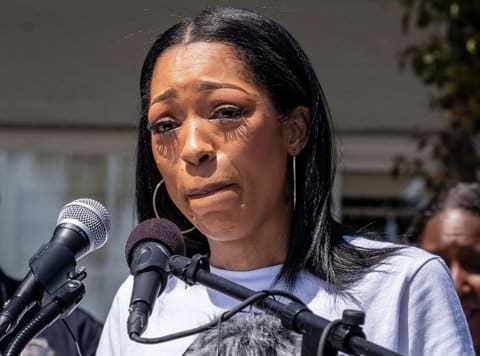
12 Sep Q&A: ‘Numbers … Had to Be Wrong’: Advocate Says Homeless Count Doesn’t Match What She Sees on the Streets

Nichole Gardner tears up as she shares an anecdote about a homeless man who benefitted from the transitional hotel program at the unveiling of Opportunity Village in Antioch on April 27, 2023. (Harika Maddala / Bay City News / Catchlight Local)
Interview, Malcolm Marshall
Editor’s Note: Nichole Gardner founded the nonprofit Facing Homelessness in Antioch in 2017. The Pulse spoke to her last month to get her perspective on the official report that the number of homeless people is down in Contra Costa County as a whole and in Antioch specifically, though the city still has the most unhoused residents. Below is our full conversation, edited for length and clarity.
Contra Costa Pulse: What kind of outreach work does your organization do in Antioch?
Nichole Gardner: We do street outreach every week in Antioch. Our team goes out and serves hot meals, distributes clothing, blankets and basic necessities to people living outside. We’ve been doing this for almost nine years, so we’re very familiar with many of the unhoused folks in the community. We’re hoping to get more funding so we can increase how often we go out.
Contra Costa Pulse: What was your reaction to the reported 40% drop in homelessness in Antioch?
Nichole Gardner: When I first heard the numbers, I thought they had to be wrong. Even last year, I didn’t think the count reflected what’s really happening. There are so many people I know who weren’t counted. I asked the county if our organization could help with the Point-in-Time Count, since we go into deep encampments and connect with people all over the city. They said no — they only count in certain locations, and a lot of people don’t go to those spots.
It’s frustrating. When the numbers say homelessness is going down, people think the problem is getting better and that we don’t need to invest in it anymore. That’s just not the case.
Contra Costa Pulse: Do the numbers match what you’re seeing on the ground?
Nichole Gardner: No, I’m seeing more people. Even folks who were in transitional housing are ending up back on the streets because they can’t keep up with the rent — even in shared housing. Rent is just too high, and for people trying to stabilize, balance bills and rebuild, it’s overwhelming.
There are encampments out here that people don’t even know about. Some folks have been homeless for over 10 years. These are people from Antioch, not from somewhere else. That’s a stereotype that needs to be cleared up. The stats show most unhoused residents in Antioch are from Antioch or the East Bay.
Contra Costa Pulse: What local efforts are working or helping in Antioch?
Nichole Gardner: I think the CORE teams are good. I’ve talked to a lot of folks on those teams and the Angelo Quinto mental health crisis response team, which often deals with unhoused residents. They’re doing their best, but they’ll tell you they don’t have the housing resources they need.
>>>From Our Archives:
Angelo Quinto Crisis Team Will Give Others the Chance He Never Got<<<
They respond when the community calls, so police aren’t going out for non-criminal issues — which I think is great. But again, they’re limited in what they can offer. The cities around here really need to come together to support housing and services.
Contra Costa Pulse: What progress has the city made with transitional housing?
Nichole Gardner: I advocated for transitional housing for years, and our former mayor really pushed for it. In 2023, the city launched its first transitional housing project. I believe we housed about 93 people through that two-year program, helping them move from motels to shared or rented rooms.
Just last month, the new City Council extended the Opportunity Village lease for another 18 months. So we are doing something — and I’m thankful for that — but the need is still too great.
Contra Costa Pulse: What are the root causes of homelessness you’re seeing?
Nichole Gardner: It’s a mix. Some people were illegally evicted. Others are younger folks who had conflicts with their families, including cases where their families didn’t accept their sexuality. For some, it’s mental illness or substance use. But mostly, it’s just the high cost of housing. People lose their homes and can’t afford to get back in. That’s what I’m seeing.
Contra Costa Pulse: If the city could do one thing tomorrow to make a real difference, what would it be?
Nichole Gardner: Treat people with dignity. I know we can’t build permanent housing overnight, but we can choose not to criminalize people who are unhoused. The City Council could direct police and code enforcement to stop taking people’s belongings. That happens all the time, and it’s devastating.
If we can’t house everyone today, let’s at least put out porta-potties and dumpsters. People complain about seeing folks using the restroom in public, but then they don’t want to fund basic sanitation. What do they expect? If you don’t want to see people suffering, support the things that would help them survive with some dignity.



No Comments